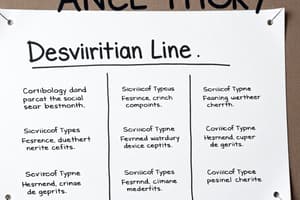Podcast
Questions and Answers
What is the relationship between deviance and social norms?
What is the relationship between deviance and social norms?
- Deviance reinforces social norms.
- Deviance is behavior that breaks social norms and provokes negative reactions. (correct)
- Deviance is universally defined the same across all societies.
- Deviation from social norms is always illegal.
How does formal social control differ from informal social control?
How does formal social control differ from informal social control?
- Formal social control applies to all types of behavior.
- Formal social control is used for behaviors violating formal norms. (correct)
- Both formal and informal social controls are identical in function.
- Informal social control is enforced by laws.
What did Emile Durkheim believe about deviance?
What did Emile Durkheim believe about deviance?
- All deviance leads to social chaos.
- Deviance should be completely eliminated in all societies.
- Deviance is always a negative aspect of society.
- Deviance is a normal part of society and can foster social change. (correct)
According to Robert Merton's Strain Theory, what can lead to deviance?
According to Robert Merton's Strain Theory, what can lead to deviance?
Which of the following behaviors would be categorized as retreatism?
Which of the following behaviors would be categorized as retreatism?
Which type of deviance involves adapting to economic stress through illegal means?
Which type of deviance involves adapting to economic stress through illegal means?
Why might some behaviors be considered deviant in one society but acceptable in another?
Why might some behaviors be considered deviant in one society but acceptable in another?
What does social disorganization refer to in the context of deviance?
What does social disorganization refer to in the context of deviance?
Which of the following is NOT a goal of punishment in the criminal justice system?
Which of the following is NOT a goal of punishment in the criminal justice system?
What does differential association theory primarily focus on?
What does differential association theory primarily focus on?
According to the goals of punishment, which option represents a method aimed at preventing future crimes?
According to the goals of punishment, which option represents a method aimed at preventing future crimes?
Who is associated with the idea of differential association in criminal behavior?
Who is associated with the idea of differential association in criminal behavior?
What is the primary principle of the social learning theory in relation to criminal behavior?
What is the primary principle of the social learning theory in relation to criminal behavior?
What is the primary reason individuals commit deviant or criminal acts according to the content?
What is the primary reason individuals commit deviant or criminal acts according to the content?
Which statement best describes the insanity defense in the context provided?
Which statement best describes the insanity defense in the context provided?
What does 'retroflexive reformation' suggest in the context of committing deviant acts?
What does 'retroflexive reformation' suggest in the context of committing deviant acts?
How does the content characterize human nature regarding deviant behavior?
How does the content characterize human nature regarding deviant behavior?
What role does learning play in the commission of deviant acts?
What role does learning play in the commission of deviant acts?
What might encourage an individual to engage in deviant behavior according to the content?
What might encourage an individual to engage in deviant behavior according to the content?
What is suggested by the phrase 'individual encounters a problematic situation'?
What is suggested by the phrase 'individual encounters a problematic situation'?
What factor is emphasized as a prerequisite for committing a deviant act?
What factor is emphasized as a prerequisite for committing a deviant act?
What does Differential Opportunity theory seek to explain?
What does Differential Opportunity theory seek to explain?
According to Social Control Theory, what factor decreases the likelihood of deviance?
According to Social Control Theory, what factor decreases the likelihood of deviance?
What is the primary outcome of labeling theory?
What is the primary outcome of labeling theory?
Which of the following is NOT a key aspect of Travis Hirschi's Social Control Theory?
Which of the following is NOT a key aspect of Travis Hirschi's Social Control Theory?
What does 'Involvement' refer to in Hirschi's Social Control Theory?
What does 'Involvement' refer to in Hirschi's Social Control Theory?
What describes the Subculture of Violence theory?
What describes the Subculture of Violence theory?
Which measurement method collects crime data through self-reports from individuals?
Which measurement method collects crime data through self-reports from individuals?
Who is associated with the concept of Focal Concern as it relates to lower-class subcultures?
Who is associated with the concept of Focal Concern as it relates to lower-class subcultures?
What does social control theory, as articulated by Travis Hirshi, suggest about individuals and deviance?
What does social control theory, as articulated by Travis Hirshi, suggest about individuals and deviance?
According to social control theory, what role do strong social bonds play?
According to social control theory, what role do strong social bonds play?
What is one of the techniques of neutralization identified by Sykes and Matza?
What is one of the techniques of neutralization identified by Sykes and Matza?
Which of the following statements is aligned with the view of human nature in social control theory?
Which of the following statements is aligned with the view of human nature in social control theory?
What does conformity in social control theory depend upon?
What does conformity in social control theory depend upon?
Which of the following best describes 'denial of injury'?
Which of the following best describes 'denial of injury'?
What is meant by 'appeal to higher loyalty' in techniques of neutralization?
What is meant by 'appeal to higher loyalty' in techniques of neutralization?
What is a common misconception regarding conformity and social bonds?
What is a common misconception regarding conformity and social bonds?
Which of the following statements is NOT true concerning the conditions for deviance?
Which of the following statements is NOT true concerning the conditions for deviance?
Which method is NOT considered a technique of neutralization?
Which method is NOT considered a technique of neutralization?
Flashcards
Deviance
Deviance
Behavior that breaks social norms and elicits negative social reactions.
Crime
Crime
Deviant behavior that violates laws.
Social Control
Social Control
Society's attempts to prevent and sanction norm-violating behavior.
Formal Social Control
Formal Social Control
Signup and view all the flashcards
Informal Social Control
Informal Social Control
Signup and view all the flashcards
Relativity of Deviance
Relativity of Deviance
Signup and view all the flashcards
Strain Theory
Strain Theory
Signup and view all the flashcards
Social Disorganization
Social Disorganization
Signup and view all the flashcards
Conventional Crime
Conventional Crime
Signup and view all the flashcards
Criminal Justice System
Criminal Justice System
Signup and view all the flashcards
Goals of Punishment
Goals of Punishment
Signup and view all the flashcards
Differential Association Theory
Differential Association Theory
Signup and view all the flashcards
Social Learning Theory
Social Learning Theory
Signup and view all the flashcards
Differential Opportunity Theory
Differential Opportunity Theory
Signup and view all the flashcards
Deviant Subcultures
Deviant Subcultures
Signup and view all the flashcards
Social Control Theory
Social Control Theory
Signup and view all the flashcards
Attachment (Social Control)
Attachment (Social Control)
Signup and view all the flashcards
Labeling Theory
Labeling Theory
Signup and view all the flashcards
National Incident-Based Reporting System (NIBRS)
National Incident-Based Reporting System (NIBRS)
Signup and view all the flashcards
Self-Report Surveys
Self-Report Surveys
Signup and view all the flashcards
Why Deviance?
Why Deviance?
Signup and view all the flashcards
Neutral Human Nature?
Neutral Human Nature?
Signup and view all the flashcards
Individual Encounters
Individual Encounters
Signup and view all the flashcards
Problematic Situations
Problematic Situations
Signup and view all the flashcards
The Pravo Experiment
The Pravo Experiment
Signup and view all the flashcards
Retroflexive Reformation
Retroflexive Reformation
Signup and view all the flashcards
Deviant Skillset
Deviant Skillset
Signup and view all the flashcards
Deviant Act: Choosing a Path
Deviant Act: Choosing a Path
Signup and view all the flashcards
What drives conformity?
What drives conformity?
Signup and view all the flashcards
Techniques of Neutralization
Techniques of Neutralization
Signup and view all the flashcards
Appeal to Higher Loyalty
Appeal to Higher Loyalty
Signup and view all the flashcards
Condemning the Condemner
Condemning the Condemner
Signup and view all the flashcards
Denial of Injury
Denial of Injury
Signup and view all the flashcards
Denial of Responsibility
Denial of Responsibility
Signup and view all the flashcards
Denial of Victim
Denial of Victim
Signup and view all the flashcards
Strong social bonds lead to…
Strong social bonds lead to…
Signup and view all the flashcards
Hirschi's social control theory
Hirschi's social control theory
Signup and view all the flashcards
Study Notes
Social Control and the Relativity of Deviance
- Deviance is behavior that violates social norms and elicits negative reactions.
- Some behaviors are so harmful that laws prohibit them. Crime is a common type of deviance.
- Social control is how society prevents and punishes norm-violating behavior.
- Informal social control addresses violations of informal norms; formal social control deals with violations of formal norms.
- Emile Durkheim argued deviance is normal, increasing conformity, social bonding, and positive social change.
- Deviance can be acceptable in one society but deviant in another, changing over time.
- Social ecology suggests neighborhood characteristics influence crime rates. Social disorganization is the weakening of social bonds and societal institutions.
- Strain theory (Robert Merton) posits deviance stems from the inability to achieve societal goals (like financial success) through acceptable means. Merton's typology outlines different adaptations to this strain.
- Differential opportunity theory explains why people choose criminal activity.
- Deviant subcultures often result from status frustration or the adoption of focal concerns.
- Subculture of violence emphasizes violent responses to perceived insults.
- Social control theory (Travis Hirschi) links deviance to weak bonds with societal institutions (family, school). Attachment, commitment, involvement, and belief are key components of this theory.
- Differential association theory suggests deviance is learned through interaction with others.
- Labeling theory posits that being labeled as deviant increases the likelihood of engaging in deviant behavior.
Measurement of Crime
- National Incident-Based Reporting System (FBI) tracks crime statistics.
- Self-report surveys gather data from individuals about their criminal behavior.
Criminal Justice System
- Direct social control is negative and formal (punishment).
- Goals of punishment include deterrence, incapacitation, rehabilitation, retribution, and restoration.
- Insanity defense is a legal concept.
- Resocialization, community justice, and various punishments (e.g. specific/general deterrence, incapacitation, rehabilitation) are examples of interventions within the criminal justice system.
- Social bond strength relates to conformity.
Differential Association Theory
- Social learning theory is a key concept.
- Deviance is learned through interactions. Individuals assess situations and select actions based on learned behaviors and attitudes.
- Interactions with others influence definitions of deviance. favorable techniques of neutralization affect deviance. (Appeal to higher loyalty; denial of injury; denial of victim; condemning the condemners; denial of responsibility).
Studying That Suits You
Use AI to generate personalized quizzes and flashcards to suit your learning preferences.
Related Documents
Description
Test your understanding of social control and the relativity of deviance. This quiz explores key theories and concepts, including the definitions of deviance, the impact of social norms, and how social ecology influences crime rates. Challenge yourself with questions based on Emile Durkheim and Robert Merton's theories.





